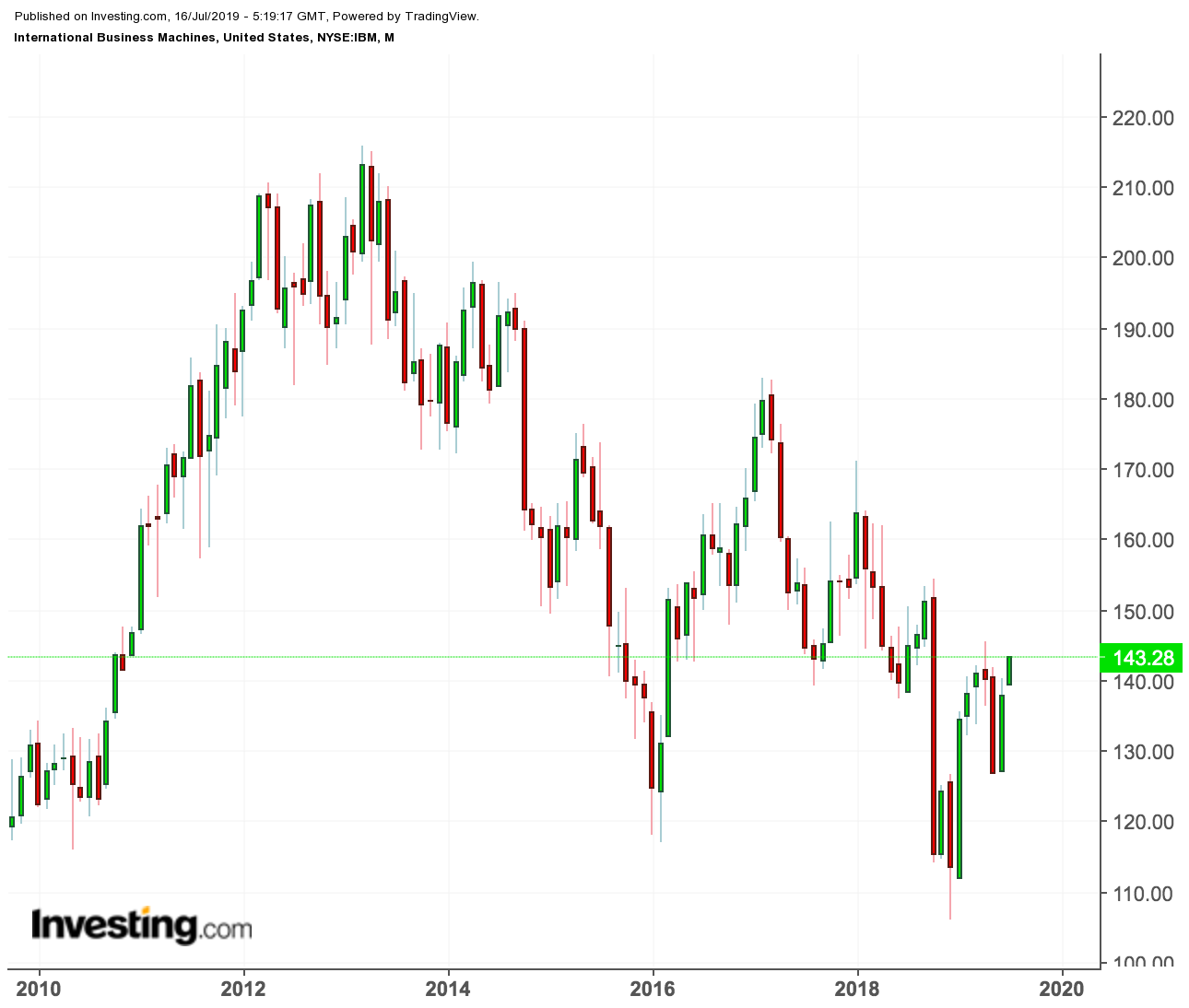* Reports Q2 2019 results on Wednesday, July 17, after the market close
* Revenue Expectation: $19.18 billion
* EPS Expectation: $3.08
The road ahead for IBM (NYSE:IBM) isn’t an easy one. After seeing a consistent decline in sales, investors are now looking for signs that the company’s recent mega-acquisition of Red Hat will soon begin to pay off and help revive growth.
IBM has struggled for years to produce growth through its traditional engines such as equipment sales and IT services. In an era when Amazon (NASDAQ:AMZN) and Alphabet’s Google (NASDAQ:GOOGL) have invented new ways to provide infrastructure support to large corporations, Big Blue has failed to capture a significant share of these new markets, such as cloud computing and artificial intelligence.
Sales grew just 1% in 2018, breaking a six-year run of declines. For the quarter that ended on June 30, analysts expect the company to report a drop of more than 4% in sales to $19.18 billion. And for the current fiscal year, they predict revenue to decline to $77.8 billion – the lowest since the late 1990s.

Shares of this tech giant, which dominated computing's early decades with inventions such as the mainframe and later the floppy disk, have rallied over the last months, closing yesterday's session at $143.30 — up more than 25% this year. But over the past five years, they've lost 25%, massively underperforming the tech-heavy Nasdaq 100 (+85%).
Red Hat Deal: A Game-Changer?
With the recent upsurge in its stock, investors may be concerned that the rally has run its course and the stock is therefore becoming risky. In the short-run, that could be true, but we are becoming more confident that the company is on the right track to achieve its long-term turnaround plan.
The linchpin of CEO Ginni Rometty’s strategy was to arrest a slowdown in sales by capturing a larger share of new growth areas in the digital economy. That goal remained a distant dream until last year as the company’s efforts to grow organically failed to produce results and satisfy investors.
But that won’t be the case going forward. In our view, IBM’s $34-billion purchase of Red Hat (NYSE:RHT), completed this month, will prove a game-changer. This acquisition will add a relatively high-margin software business to IBM’s stable of offerings, especially in its provision of hybrid cloud services to corporate customers.
About 85% of all enterprises are expected to adopt a hybrid cloud approach in which most will use a mix of public cloud services like Amazon Web Services alongside their own private cloud networks, according to a forecast from Jefferies & Co.
Cloud revenue accounted for one-quarter of IBM’s total revenue over the past 12 months to the end of April, up from 22% a year earlier. And there is a good possibility that the company will succeed in accelerating that momentum after the Red Hat acquisition.
For long-term investors whose aim is a steady income stream, owning IBM stock makes a lot of sense. The company plans to return about 70%-80% of free cash flow to shareholders each year, with annual dividend increases and continued share buybacks.
IBM stock continues to remain an attractive turnaround bet, suitable for long-term investors with a 5-10 year time horizon. Despite the recent rally, its stock still yields 4.54%, double the S&P 500′s 2% average yield. The company has increased its dividend five times in the past five years, and it’s set to join the list of so-called Dividend Aristocrats in 2020, companies that have increased their dividend in 25 consecutive years.
Bottom Line
We believe the upside potential remains strong if IBM shows a sustained turnaround and can prove that its Red Hat acquisition was worth spending the largest amount the tech giant ever paid for an acquisition in its 108-year history. IBM’s growth in its cloud-computing business is a bright spot, especially when the company is well positioned to gain on competitors.
